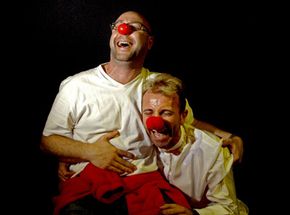Everyone has heard the phrase "laughter is the best medicine", but have you ever wondered if it's true? Can enough laughter, say, cure an illness? That question may have once elicited a chuckle from your doctor, but these days, physicians encourage patients to up their daily dose of laughter to reap certain health benefits. Psychologists studying the science of happiness believe that practicing certain positive behaviors like laughter can bring pleasure, engagement, and meaning [source: Jameson].
How does a hearty laugh improve one's health? Laughter sets off a chain reaction throughout the body that can both prevent illness and help you get well. Spontaneous laughter lowers your body's stress hormones and cortisol levels. (Cortisol is a stress-induced chemical that can lead to heart disease, high blood pressure and excess belly fat.) Laughter also strengthens your immune system because it increases the production of antibodies in your saliva and in your blood vessels, thereby staving off bacteria, viruses, and parasites.
Advertisement


